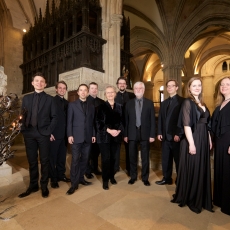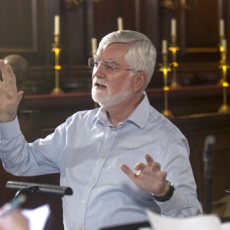Magnificat - Schütz: Cantiones sacrae - All Music
4.5*
Composer Heinrich Schütz is known for big sacred works that adapted the sumptuous multiple-choir style of the late Renaissance Venetian masters to the German language and the requirements of Protestant worship. His music has a remarkable, elevated quality that anticipated that of Bach a century later. The Cantiones Sacrae, Op. 4 are music of a different sort though, and until fairly recently, performances tended to be one-size-fits-all. If the Symphoniae Sacrae were Schütz's answer to Giovanni Gabrieli, the Cantiones Sacrae refer back to the perfect polyphony of Palestrina. In each case, however, there is a new emotionalism; here, Schütz's settings of biblical texts and some by Augustine have the quality of deep, inward meditations. Unlike Palestrina, Schütz applies considerable harmonic depth to his settings, which are somewhat like spiritual madrigals. The small English group Magnificat under director Philip Cave is probably ideal in size with its ten singers. Schütz's musical language is perhaps especially well suited to the several poetic texts from the Song of Songs; sample Ego dormio, SWV 63, for a taste of how Schütz, and how these performers, manage to be sober and hyperexpressive at the same time. There are other ways to perform the Cantiones Sacrae, which were not meant for singing all at a stretch as they are here, and they're all sung at the same tempo. However, they gain a good deal of cumulative power once you tune into their text-setting and its expressive details. The Linn/Outhere engineering crew contributes beautiful sound, lush but precise, from the University College Chapel at Oxford University. English singers have not always gotten Schütz, but they do here. Highly recommended.


